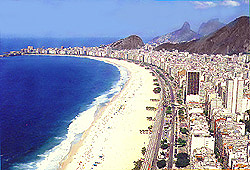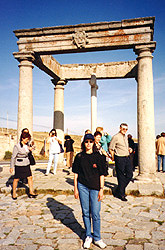 With nearly 160 million people, Brazil is a tropical country, sixteen
times as large as Spain and three times as large as India. Its sea-coast
is one of the longest in the world, at the edge of the Atlantic Ocean. Its
natural beauties are extraordinary. Rich in gold and precious stones, it
is divided in regions: Southwest, origin of the wealth that determines Brasil's
present profile. Rio de Janeiro with its natural beauty, historical and
preserved cities. In that region lives the world's most numerous collection
of humming-birds. And São Paulo, Mercosul's giant city, with nearly
18 million inhabitants (including Greater São Paulo), is considered
the lever of all national economy, with its dynamism and modern industries.
São Paulo embraces all the world's continents, from first to third
world. With nearly 160 million people, Brazil is a tropical country, sixteen
times as large as Spain and three times as large as India. Its sea-coast
is one of the longest in the world, at the edge of the Atlantic Ocean. Its
natural beauties are extraordinary. Rich in gold and precious stones, it
is divided in regions: Southwest, origin of the wealth that determines Brasil's
present profile. Rio de Janeiro with its natural beauty, historical and
preserved cities. In that region lives the world's most numerous collection
of humming-birds. And São Paulo, Mercosul's giant city, with nearly
18 million inhabitants (including Greater São Paulo), is considered
the lever of all national economy, with its dynamism and modern industries.
São Paulo embraces all the world's continents, from first to third
world.
The South region has the remarkable traces of European immigration -
especially from the Germans - with its rustic architecture, snow and beer.
Foz do Iguaçu, with its beauty and its waterfalls, is a treasurehouse
of natural beauty. The Itaipu complex, a national pride, is the world's
largest hydroelectrical plant. Grape and wine in the ultra-Italian cities
in Rio Grande do Sul, "chimarrão" (matte tea) and barbecue
attract tourists from all over the world. The integration of the European
and the native indian aspects is perfect.
The Central-west region symbolizes the conquest of the West, the occupation
of wide spaces in the steps of the first settlers. The Pantanal (swampy
region) of Mato Grosso provides a last refuge for the planet's exotic animals
in its plains, sierras and rivers. That is nature's greatness, in the heart
of South America. Brasília (the Capital city) is the mystical city
of power. In this region are concentrated the great cattle and soy farms.
The Northeast region is the birthplace of the beauty and contrasts of
Brazil's origins: the force of a people forged in the mixture of races;
the culture, folklore and tradition of popular celebrations; colonial architecture,
with its churches and historic monuments; the oasis created by man to defeat
the desert: the dunes, salt lakes and reefs adorn the sea-coast of the Brazilian
Northeast. The marine wealth of the ecologic sanctuaries is undescribable.
The North represents the sovereignity of Earth's greatest equatorial
forest: Amazon, the world's lungs, a sanctuary of flora and fauna, with
plants, animals and exotic birds. The Amazon river is "a sweet-water
sea" with more fish than the Atlantic Ocean. The forest people are
indians, gold miners and the riverside "caboclos". Carajás
is the greatest mineral reserve known by man. Brazil would be impossible
to describe in quick brush-strokes. It is so vast, mighty, rich, authentic,
that entire book collections would be necessary.
Pope John Paul II gave the best definition of Brazil: "....a country
that congregates all the world's continents". A wonderful, paradoxical,
free country, with many stars in the sky, a shining Sun all year long (what
a sunset, what a sunrise!...); an uncensored country, with everything and
nothing at the same time; with beautiful people and very ugly, mistreated,
hungry people; with rich, varied and tasty food, and at the same time many
are starving. But it is sweet Brazil, that welcomes all races, with no prejudice.
Brazil does not want war or violence. Brazil only wishes to live in PAX!
|


 With nearly 160 million people, Brazil is a tropical country, sixteen
times as large as Spain and three times as large as India. Its sea-coast
is one of the longest in the world, at the edge of the Atlantic Ocean. Its
natural beauties are extraordinary. Rich in gold and precious stones, it
is divided in regions: Southwest, origin of the wealth that determines Brasil's
present profile. Rio de Janeiro with its natural beauty, historical and
preserved cities. In that region lives the world's most numerous collection
of humming-birds. And São Paulo, Mercosul's giant city, with nearly
18 million inhabitants (including Greater São Paulo), is considered
the lever of all national economy, with its dynamism and modern industries.
São Paulo embraces all the world's continents, from first to third
world.
With nearly 160 million people, Brazil is a tropical country, sixteen
times as large as Spain and three times as large as India. Its sea-coast
is one of the longest in the world, at the edge of the Atlantic Ocean. Its
natural beauties are extraordinary. Rich in gold and precious stones, it
is divided in regions: Southwest, origin of the wealth that determines Brasil's
present profile. Rio de Janeiro with its natural beauty, historical and
preserved cities. In that region lives the world's most numerous collection
of humming-birds. And São Paulo, Mercosul's giant city, with nearly
18 million inhabitants (including Greater São Paulo), is considered
the lever of all national economy, with its dynamism and modern industries.
São Paulo embraces all the world's continents, from first to third
world.